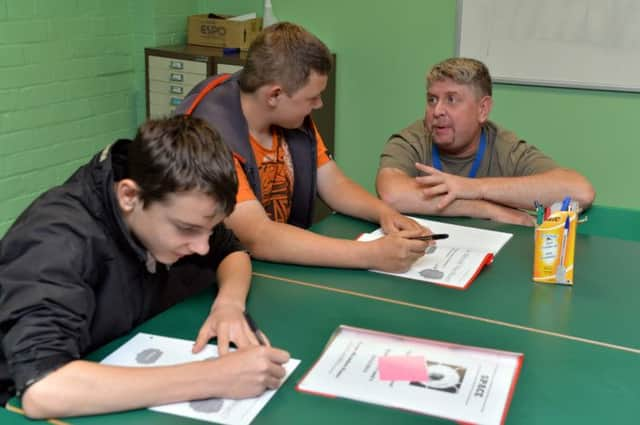Fall in number of Ashfield teens kicked out of school


The North Ashfield ‘Schools Behaviour and Attendance Partnership’ (SBAP) has seen staff from Ashfield School, Kirkby College, Sutton Community Academy and Quarrydale Academy meeting regularly to discuss students at risk of permanent exclusion and see what can be done to help them.
There has been a steady fall in the number of students being expelled from school as a result and in the last year there have been no permanent exclusions in the area at all - down from four in 2011/2 and three in 2012/3.
Advertisement
Advertisement
Steven Huntington, assistant head at Ashfield School and member of the SBAP, said that the success is down to the partnership approach.
“The idea behind the SBAP is simply to try and prevent permanent exclusions and try and improve the opportunity for students in the north Ashfield area by schools working together rather than in competition,” he said.
“There is a genuine care and passion from the four heads of the four schools that we serve the children and communities of north Ashfield.
“We want success for all four schools, not just one school.”
Advertisement
Advertisement
Monthly meetings between the schools give staff the chance to talk about ‘difficult’ students; those who are struggling to settle down due to behavioural or personal problems or have bullying or peer group issues.
Staff share ideas of what measures can be put in place to improve their situation and these can include alternative provision at the Kirkby-based SPACE Centre to re-engage them with learning, or moving a student from one school to another for a trial period.
“Anything that we can do to stop that child being permanently excluded,” said Mr Huntington.
The SBAP is now being held up as a beacon of good practice, with the secrets of its success being shared with other schools in the county.
Advertisement
Advertisement
“Permanent exclusions in north Ashfield have never ever been lower over the last three years and our fixed term exclusions are also very low,” said Mr Huntington.
“The last permanent exclusion here was three years ago for a one-off offence.”
He believes that the SBAP has changed the culture of how schools deal with problem pupils: “Prior to the current heads coming in, the exclusion rate was quite high but this was just passing the problem from one school to the next and there was no solution.
“Collectively what we are now doing is to make sure this child gets the best outcomes possible, regardless of which school he attends.
Advertisement
Advertisement
“The collaboration from the four headteachers is enormous and the honesty, openness and transparency from the schools working together ensures it works.”
A spokesman for Nottinghamshire County Council said that the work of SBAPs has resulted in permanent exclusions in primary and secondary schools reducing across the county by 52 per cent in the last two years.
“The successful implementation of the SEBD (Social, Emotional and Behavioural Difficulties) Strategy has led to an approach where the county council has progressively devolved resources to SBAPs to encourage collective responsibility and reinforce other positive processes such as fair access and managed moves,” he said.
“This has led to schools increasingly retaining responsibility for their most challenging young people and resulted in a significant reduction in permanent exclusions.
Advertisement
Advertisement
“Instead of permanently excluding children and young people with behavioural difficulties, we have encouraged schools to work together in partnership to provide improved opportunities for those who struggle in traditional settings, particularly in secondary schools.
“The North Ashfield SBAP has made very good use of the funding which prior to this strategy would be retained by the council to provide full time education in a Council Pupil Referral Unit.”